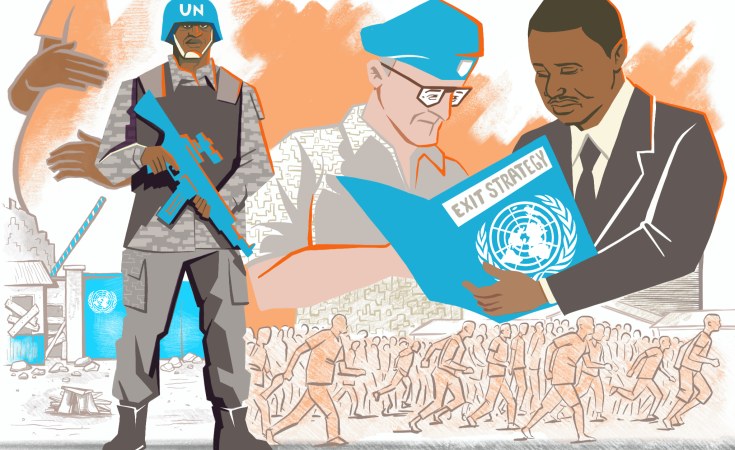Faced with a recent surge in fighting between the army and rebel forces in eastern DR Congo, several hundred women dressed in black took to the streets of the capital Kinshasa on Wednesday to demand a halt to the violence.
The women held banners reading "12 million victims since 1994", "Pity the women and families of eastern DRC" and "The Congo will remain whole and indivisible".
The march, called by the Minister for Gender, Family and Children Mireille Masangu, brought together mainly politicians and civil servants.
It went off peacefully, unlike demonstrations by dozens of youths last week in Kinshasa where protestors targetted foreign embassies and UN installations they accuse of supporting M23 rebels in the conflict-wracked east.
The march ended at the president's office, where the minister handed over a statement condemning the "expansionist wishes of Rwanda and the exploitation of the natural resources" of the DRC.
Masangu hit out at what she said was the "silence, the complicity of the international community represented by the United States, France, Belgium, the United Kingdom, Poland".
She also criticised the community's "immoral policy of supporting the aggressors (of the DRC) on the one hand, and an inappropriate humanitarian aid response on the other".
Forgotten war
Clashes have intensified in recent days around the strategic town of Sake, about 20 kms from Goma - the capital of North Kivu province.
Two South African soldiers were killed in a mortar strike in the region on Thursday, the first South African casualties since its force was deployed to help quell an insurgency.
Announcing the deaths, the South African military said three more soldiers had been wounded in an incident Wednesday near the eastern city of Goma.
Aid workers with Doctors Without Borders (MSF) say the humanitarian situation is dire.
"In the structures we support, we're treating an average of 60 cases of sexual violence per day," Stephen Goetghebuer, head of missions with MSF told RFI. "They're from the IDP camps and are survivors of this violence. But it's probably just a small proportion of the victims."
Over 135,000 people in Masisi have moved to Goma due to violence.Humanitarian partners and local authorities, in Goma, are facing immense pressure to shelter the displaced, as available space is limited.Read about the situation and response⤵️https://t.co/q8QyqoiTQ7 pic.twitter.com/LuIrVRAxaI-- OCHA Southern & Eastern Africa (@UNOCHA_ROSEA) February 14, 2024
Rwandan involvement
The DRC, the United Nations and Western countries say Rwanda is supporting the rebels in a bid to control vast mineral resources, an allegation Kigali denies.
The violence has been widely investigated by Human Rights Watch.
Dada Kasele, whose father died at the front during the second Congo war from 1998-2003, took part in Wednesday's protest.
"Why does the international community not put an end to this interminable war?" she asked.
"They all know that the main killer is called Paul Kagame," Rwanda's president, she told AFP news agency.
"We want peace - peace for our families, our parents."
The mostly-Tutsi M23 group has seized vast swathes of North Kivu since late 2021.
The UN Security Council on Monday voiced concern over "escalating violence" in eastern DRC and condemned the rebel offensive launched near Goma on 7 February.
(with AFP)


